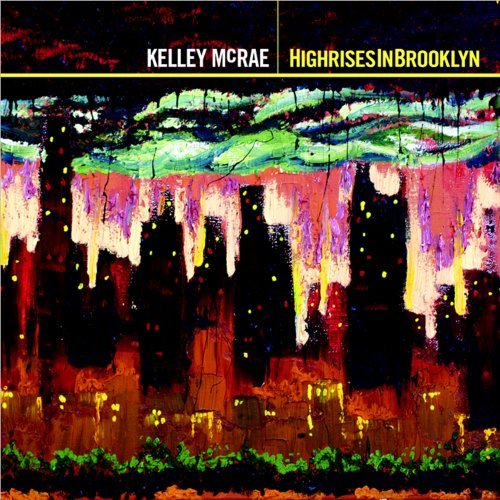
The Lowdown:
June 9, 2011
Kelley McRae: Highrises in Brooklyn
by Jason D. 'Diesel' Hamad
What’s the old saying, “never send a letter when you’re angry”? Well, no one ever told Kelley McRae not to write an album when she was angry (not to mention depressed, exasperated, insecure, vulnerable and lonely), so that’s exactly what she did. Highrises in Brooklyn came out of a period where she was getting out of a terrible relationship via a heart-rending breakup. Rather than shut down completely, she channeled her emotions into her music, as many have done before. But what could have been just another miserable cliché full of ironic bitch paeans and “you never made me cum” revenge songs was instead molded by the hands of this budding master songwriter into a tour de force full of emotional resonance.
McRae has never been afraid to bare her soul in her songs, and her debut album, Never Be, featured a number of tracks born out of her feelings of inadequacy. The best of these was Johnny Cash (which qualifies as objectively great by any standards), in which she mixes scenes from her Southern childhood with longing for the kind of love that Johnny and June found in each other. She’s one of those artists who expresses herself so well that after experiencing her work you truly feel like you know her personally, and you instantly want to track her down just so you can give her a hug.
Highrises in Brooklyn, McRae’s sophomore effort, is a pithy album—just ten songs totaling 35 minutes—but it marks a key transition. The songs on her first release were often simple and very much in the folk vein, with blues, country, gospel and some rock influences peppering the mix. With this project, she expanded her horizons greatly, building upon her down-home roots base with a much wider array of influences. It is also distinctly a rock album (if a folk rock album), undergoing a shift similar to the opposing acoustic and electric sides of Bob Dylan’s Bringing It All Back Home.
One of the great beauties of Highrises is that Brooklyn itself becomes a living, breathing character. Construction projects aimed at yuppies become metaphors for a rent heart when she sings:
And they’re building highrises in Brooklyn.
Watch out, they’re taking names.
And I am so tired of carrying ’round
The weight of your shame.
The loneliness and despair that permeates the city comes to life through lines like:
Concrete streets and subway cars,
Sometimes it feels so awfully far.
Stolen nights and long walks home
As thick as mud sticks to your bones.
And redemption is borne out of the chaos when she declares:
I’d rather hear the BQE (What’s wrong with me?)
Than the ocean waves these days.
I’d rather see a sea of faces swimming past me
Than a peaceful gaze these days.
Whether intentional or an accident of McRae’s songwriting process, it brings the album together as a cohesive whole and makes for a transcendent metaphorical device.
Kelley announces the musical shift from nearly the first notes. The picked guitar that starts off “Highrises in Brooklyn” has a bluegrass hint that suggests continuity, but the fuzzy electric bass that slips in under the vocals signals just as strongly that this will be different. The tempo shift after the introduction is an even stronger clue, as Caribbean-tinged keyboards are joined by echoing vocal effects. Unfortunately, it’s possible that the pendulum swings too far towards the nouveau on this particular song. It’s just slightly schizophrenic, and at one point seems like it might actually want to be a dance song when it grows up. Still, this lasts only a moment, and while it may prevent the song from reaching the heights of greatness, it’s a near miss based on the merits of the up tempo music, clapped-hand percussion, counterpoint vocal accents and the lyrics, which alternately discuss the gentrification of Brooklyn and the failed relationship that is the focus of virtually every song in this collection. Perhaps the best line comes near the end, as Kelley begins to break out of her bindings, declaring:
Smoke, it has a shadow but it’s really only air
And the love that you gave me, nothing has compared.
But that’s only ‘cause I insist on eating shit
And good ain’t so good if this is as good as it gets.
“Long Walk Home” starts off with dark bass and a spooky echoing guitar scratch that perfectly mirrors the slight paranoia that often accompanies a late-night inebriated walk through the concrete maze. This feeling is only enhanced by McRae’s gorgeous, succinct lyrics, delivered in flowing phrases paradoxically built of staccato words. “Late night bars, cigarettes,” she sings:
No we haven’t got there yet.
No, we haven’t even come close to
Coffee cups, diner dreams.
Not as bad as it seems.
Not as bad as where you’re coming from.
The ooooohing background vocals rise and fall in a way that further heightens the tension, joining Kelley on the choruses and thereby highlighting her solitude. All in all, it makes for a perfect portrait of a sad, slightly crazed girl in a sad, often crazy city filled to the brim with people who are completely alone.
Kelley performs a beautiful duet version of "Sparrow" with Andrew Rose Gregory
“Sparrow” is not just the best song on the album, but easily one of the most powerful songs ever written by anyone, anytime, anywhere, and I stake my entire (admittedly small) cache of credibility on that statement. It is simple and incredibly beautiful, with Kelley’s delicate yet soulful voice gliding across her strummed guitar. While many of McRae’s compositions are deeply personal, this song cuts right to the bone, leaving her soul completely bare to the world. Steeped in the depression and insecurity that drips from every pore of this album, it is a picture of Kelley at her absolute lowest, a portrait painted in the artist’s own desolate tears. She confides:
Sometimes I feel like a whore
Who will sell it all for cheap
If it’s all that I’ve got,
‘Cause a girl’s gotta eat.
It ain’t what I want
But it’s all that I see.
Sometimes I feel like a whore.”
A laid-back bluesy number with dancing piano, “Last Call Town” grows to reach a powerful crescendo that highlights Kelley’s R&B-inspired vocal abilities. She warns:
Don’t look for love in a last call town,
Full of ramblers artists and thieves,
’Cause we will only bring you down
If you’re lookin’ to play for keeps.
As the song progresses, it becomes apparent that she is talking to herself, broken as she is by the oppression of the fast-moving city and its fast-loving denizens. The song may not be as catchy as “Highrises” nor as potent as “Sparrow,” but it is undeniably a well-written sketch of life in a town that is always up for another round.
If “Last Call” was bluesy, “More of Nothin’” is blues at its purest, complete with backup singers doing their best impression of the Vandellas. McRae’s voice is perfect, and at times it feels like she may be the petit, white reincarnation of Big Mama Thornton. Lyrically, it doesn’t stray far from the album’s theme of broken love songs, but it is powerful, lively, and beautifully executed.
“Fall” is the only real miss on the album. It seems McRae tried to go a bridge too far with the vocal power (she is, after all, a skinny white girl from Mississippi, reincarnation or not). It works when she’s got the instrumentals to back her up, but the music here is frankly horrid. It tries to stretch itself into an operatic power, but falls flat. In fact—and I can’t believe I’m about to say this—it reminds me of Celine Dion. Ugh, I think I just threw up a little. It’s overly produced and overly dramatic, the orchestral strings and overwrought vocals sounding like a cheesy movie theme. Where “Sparrow” was honest and naked, “Fall” seems contrived and forced. Nevertheless it is only one song out of ten, and that’s what they made the skip button for.
“Tomorrow” returns to a simpler, more laid-back feeling, starting with a light cymbal rhythm and acoustic guitar and building from there. Again it is about the loneliness of the city, but this time Kelley finds some solace in the people around her, realizing that many of them are going through the same thing she is.
“Keep You,” follows a burgeoning relationship as its summer inception moves into the long winter slide. It remains full of that trademark insecurity, as the obvious summer/winter good times/bad times metaphor leaves Kelley longing for a love that can burn through the cold. Fuzzy guitar, ringing bells, echoing percussion. and alternating staccato and sustained keyboard chords add to the slow-moving musical landscape, making the instrumental work the star of this particular show.
Opening with a series of organ chords which—if not for a spritely percussion part—seem like they could come straight out of a church service, “BQE” quickly opens up into a synthesizer-led beat song with vocals heavy on the reverb. Not to crib from the aforementioned Dylan album, but it brings it all back home, demonstrating Kelley’s love for Brooklyn and showing that despite its myriad flaws she knows she’s exactly where she’s supposed to be. It’s still full of the “quiet desperation” and expectations of loss that fill the album’s other songs, but bolstered by the upbeat notion that no matter what happens she is going to be alright, even if the neighborhood is blighted by monstrous condos and her heart occasionally gets broken along the way.
Finally there’s “So Far,” which is reminiscent of Jewel and returns to the roots base of earlier works. It continues the redemption theme seen in “BQE” with Kelley forgiving her love/nemesis in lines like:
This city is all eyes and hands.
It will take everything it can;
Turn you into someone you don’t know.
But there’s something gained where you were lost,
And I’m trying hard not to count the cost,
But my heart just doesn’t wanna let it go.
More than any other song on the album it suggests a positive outlook, making it the perfect closing note and providing a mellow dénouement to Highrises’ epic, twisted love story.
Highrises in Brooklyn is not perfect. “Fall” is an unfortunate misstep and “Tomorrow” drags in places. But the album contains one absolutely sublime song and is chock full of very good ones. Before the age of thirty, Kelley McRae managed to write two songs that stand among the true greats, an accomplishment many artists work for a lifetime and never achieve. But Kelley is still evolving as a songwriter. Like Lucinda Williams, she has an amazing talent for channeling her pain into her art, and only time (and her next album) will tell if she can avoid her most powerful influence’s fate and find a way to maintain her stride now that she’s (thankfully) reached a better place in life. I’m confident that she’ll pull it off, and highly recommend that you get into her music now. It can only pay dividends in the future.
| mp3 | cd |
|---|---|







